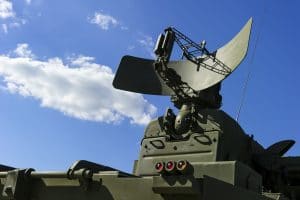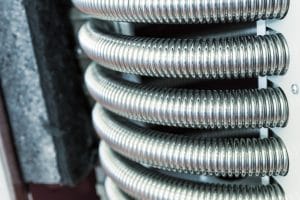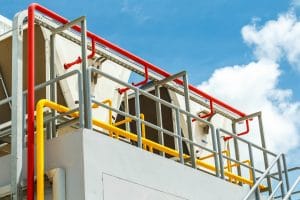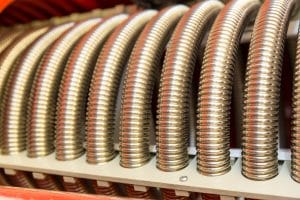 At their core, the main benefit of using heat exchangers instead of air conditioning equipment to cool electrical enclosures is that they require much less energy to operate, thereby reducing a company’s overhead. Less energy also means a smaller environmental footprint, so by design, simply switching to heat exchangers is a significant step in going green. However, the way heat exchangers harness and transfer heat gives them the ability to do much more. For instance, in the case of solar water heating, a system of ecofriendly heat exchangers can ensure that the energy solar panels absorb is utilized for maximum benefits with minimal effort. (more…)
At their core, the main benefit of using heat exchangers instead of air conditioning equipment to cool electrical enclosures is that they require much less energy to operate, thereby reducing a company’s overhead. Less energy also means a smaller environmental footprint, so by design, simply switching to heat exchangers is a significant step in going green. However, the way heat exchangers harness and transfer heat gives them the ability to do much more. For instance, in the case of solar water heating, a system of ecofriendly heat exchangers can ensure that the energy solar panels absorb is utilized for maximum benefits with minimal effort. (more…)
Propelling Automated Tech with Heat Exchangers
 It isn’t just the fact that heat exchangers help companies save impressive amounts of money on energy costs. It’s that they also operate almost autonomously, needing little maintenance to operate continuously for years. For small electronics, this means more powerful and efficient personal devices. For manufacturing companies and other industries, this means the ability to more efficiently integrate automated technology into their everyday operations. To see the streamlined productivity and savings that automation can provide, heat exchanger technology helps ensure that equipment can continue operating with minimal human interaction. (more…)
It isn’t just the fact that heat exchangers help companies save impressive amounts of money on energy costs. It’s that they also operate almost autonomously, needing little maintenance to operate continuously for years. For small electronics, this means more powerful and efficient personal devices. For manufacturing companies and other industries, this means the ability to more efficiently integrate automated technology into their everyday operations. To see the streamlined productivity and savings that automation can provide, heat exchanger technology helps ensure that equipment can continue operating with minimal human interaction. (more…)
Efficiently Meeting NEMA Standards for Electrical Control Panels
 Developing and implementing innovative technology while sticking to precise safety and operation standards is a fine line to walk. However, it’s a necessary one not only to uphold user safety, but also to ensure the integrity of the technology being used. Among the many benefits of green energy heat exchangers, one of the greatest is the ability to meet the various NEMA standards that apply to electrical control panels and their thermal management solutions. (more…)
Developing and implementing innovative technology while sticking to precise safety and operation standards is a fine line to walk. However, it’s a necessary one not only to uphold user safety, but also to ensure the integrity of the technology being used. Among the many benefits of green energy heat exchangers, one of the greatest is the ability to meet the various NEMA standards that apply to electrical control panels and their thermal management solutions. (more…)
The Role of Modern Heat Exchangers
 You might consider the engine in your vehicle it’s most important feature, considering that without it, the vehicle wouldn’t run. However, if the radiator didn’t work or wasn’t efficient enough, then the engine’s performance (which makes it so important) wouldn’t be anywhere near what it should be. In fact, before long, it would be nonexistent. Similarly, the ability to transfer heat away from high-performing but sensitive electrical equipment has become one of modern heat exchangers’ most essential roles. More efficient cooling means more effective technology, and in an era where innovation is par for the course, that often means relying on customized heat exchangers. (more…)
You might consider the engine in your vehicle it’s most important feature, considering that without it, the vehicle wouldn’t run. However, if the radiator didn’t work or wasn’t efficient enough, then the engine’s performance (which makes it so important) wouldn’t be anywhere near what it should be. In fact, before long, it would be nonexistent. Similarly, the ability to transfer heat away from high-performing but sensitive electrical equipment has become one of modern heat exchangers’ most essential roles. More efficient cooling means more effective technology, and in an era where innovation is par for the course, that often means relying on customized heat exchangers. (more…)
Creating Ruggedized Heat Exchangers for Intense Applications
 In the most popular applications, heat exchangers are utilized to cool electrical enclosures of all sizes, from control panels on manufacturing equipment to more complex automated technology, and more. In such applications, heat exchangers provide smaller, more effective thermal management units that can be designed to fit into significantly smaller spaces than other solutions. However, some industries require a little more from its technology than just efficient and ecofriendly performance. For instance, military and aerospace applications also need solutions that can make it through especially tough conditions, such as traveling at different velocities, withstanding significant impacts, and/or being pushed quickly through varying levels of air pressure. (more…)
In the most popular applications, heat exchangers are utilized to cool electrical enclosures of all sizes, from control panels on manufacturing equipment to more complex automated technology, and more. In such applications, heat exchangers provide smaller, more effective thermal management units that can be designed to fit into significantly smaller spaces than other solutions. However, some industries require a little more from its technology than just efficient and ecofriendly performance. For instance, military and aerospace applications also need solutions that can make it through especially tough conditions, such as traveling at different velocities, withstanding significant impacts, and/or being pushed quickly through varying levels of air pressure. (more…)
Solving Thermal Management Problems with Heat Exchangers
 For over 40 years, Noren’s goal has been to not only provide more cost-efficient products, but also to produce solutions that eliminate many of the hassles that often come with electrical thermal management. For instance, the savings that heat exchangers produce when it comes to energy consumption could be offset if the units needed constant maintenance, or if they broke down due to inadequate protection against contamination. To truly help improve the efficiency and reliability of modern technology, heat exchangers are designed to specifically address these and many other concerns. (more…)
For over 40 years, Noren’s goal has been to not only provide more cost-efficient products, but also to produce solutions that eliminate many of the hassles that often come with electrical thermal management. For instance, the savings that heat exchangers produce when it comes to energy consumption could be offset if the units needed constant maintenance, or if they broke down due to inadequate protection against contamination. To truly help improve the efficiency and reliability of modern technology, heat exchangers are designed to specifically address these and many other concerns. (more…)
Below-Ambient Cooling for Control Panels without Air Conditioners
 Even on a relatively hot day, most climates are still cool enough for modern electrical equipment to operate efficiently (assuming its circuits weren’t sealed off in small enclosures). For this reason, many industries rely on ambient heat exchangers for more efficient thermal management rather than air conditioners that dramatically lower temperatures inside of electrical enclosures. However, that isn’t always the case; some climates are much hotter than others, and some systems are so powerful that they emit too much waste heat for an ambient cooling system to be effective. Therefore, Noren also provides high-quality systems that provide below-ambient cooling for control panels and other enclosures without having to rely on air conditioning technology. (more…)
Even on a relatively hot day, most climates are still cool enough for modern electrical equipment to operate efficiently (assuming its circuits weren’t sealed off in small enclosures). For this reason, many industries rely on ambient heat exchangers for more efficient thermal management rather than air conditioners that dramatically lower temperatures inside of electrical enclosures. However, that isn’t always the case; some climates are much hotter than others, and some systems are so powerful that they emit too much waste heat for an ambient cooling system to be effective. Therefore, Noren also provides high-quality systems that provide below-ambient cooling for control panels and other enclosures without having to rely on air conditioning technology. (more…)
The Impact of Heat Exchangers on Water Quality
 Due to regulations and increasing demands for more ecofriendly processes, waste water treatment is one of the more fertile fields for heat exchangers to improve operations. Heat exchangers not only provide effective cooling methods for modern equipment, but also help essential equipment fit into smaller areas, saving space where it’s most needed. With more efficient thermal management technology, waste water treatment equipment can operate more reliably for longer, without needing extensive maintenance. For some facilities, heat exchangers can also repurpose waste water that has absorbed thermal energy to be used for other processes, further improving the facility’s efficiency. (more…)
Due to regulations and increasing demands for more ecofriendly processes, waste water treatment is one of the more fertile fields for heat exchangers to improve operations. Heat exchangers not only provide effective cooling methods for modern equipment, but also help essential equipment fit into smaller areas, saving space where it’s most needed. With more efficient thermal management technology, waste water treatment equipment can operate more reliably for longer, without needing extensive maintenance. For some facilities, heat exchangers can also repurpose waste water that has absorbed thermal energy to be used for other processes, further improving the facility’s efficiency. (more…)
How Heat Exchangers Measure Up to Air Conditioning
 While there are still many applications that require the air-chilling abilities of traditional air conditioners, heat exchangers are an increasingly more preferable option for cooling electrical control panels and manufacturing equipment. In fact, even in particularly hazardous conditions, Noren’s specialized line of heat exchangers can provide a more efficient and reliable alternative to air conditioners. That’s because, in most instances, the ability to successfully transfer heat away is all that is needed to cool sensitive electrical equipment. With heat exchangers, this can be accomplished at a fraction of the cost, and with a significantly lower environmental imprint. (more…)
While there are still many applications that require the air-chilling abilities of traditional air conditioners, heat exchangers are an increasingly more preferable option for cooling electrical control panels and manufacturing equipment. In fact, even in particularly hazardous conditions, Noren’s specialized line of heat exchangers can provide a more efficient and reliable alternative to air conditioners. That’s because, in most instances, the ability to successfully transfer heat away is all that is needed to cool sensitive electrical equipment. With heat exchangers, this can be accomplished at a fraction of the cost, and with a significantly lower environmental imprint. (more…)
Integrating Heat Exchangers into the Oil & Gas Industry
 Technology and energy go hand in hand, so it makes sense that much of technology has focused on making energy production and consumption more efficient. In the field of oil and gas production, this has been as challenging as it is important due to several unique factors, including hazardous environments and significant difficulties performing maintenance. To help combat these challenges, Noren’s Hazloc heat exchangers have been integrated into many applications in the oil and gas industry. Today, they continue to help organizations reduce thermal management costs and improve overall efficiency. (more…)
Technology and energy go hand in hand, so it makes sense that much of technology has focused on making energy production and consumption more efficient. In the field of oil and gas production, this has been as challenging as it is important due to several unique factors, including hazardous environments and significant difficulties performing maintenance. To help combat these challenges, Noren’s Hazloc heat exchangers have been integrated into many applications in the oil and gas industry. Today, they continue to help organizations reduce thermal management costs and improve overall efficiency. (more…)







